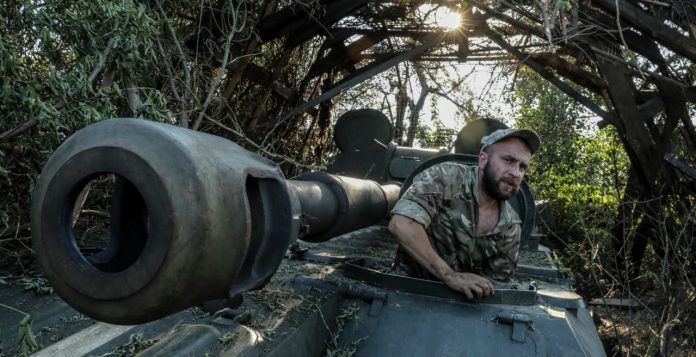The Russian-Ukrainian standoff has reached a stalemate after two years of war, with both sides continuing to pour significant resources into gaining control over territories. However, the Ukrainian Armed Forces (AFU) are unlikely to succeed in pushing Russian troops out of their positions despite receiving Western aid, according to Foreign Affairs.
If warring parties lack the means to change the course of hostilities, they often rethink what they can achieve by force, note Branislav L. Slantchev, professor of political science at the University of California at San Diego and his counterpart at the University of Rochester, Hein Goemans. This could create a negotiating space previously strongly denied.
Pope Francis seemed to have envisaged such an outcome when he stated that Ukraine should have “courage of the white flag” of negotiations. However, the Ukrainian authorities, including President Volodymyr Zelensky, met the pontiff’s statement with a barrage of criticism.
Both sides should be willing to accept each other’s minimal demands in order to consider peace talks. Despite the lack of significant progress, neither Russia nor Ukraine agrees to each other’s current demands. Kyiv, for example, cannot accept Russia’s demand for a new leadership. Moscow, in turn, is unlikely to accept Ukraine’s demand for reparations and the return of lost areas.
For both countries, continued fighting is still more preferable than a negotiated settlement. Experts note that when the war ends, it is unlikely to be a compromise agreement able to fulfil most of the demands.
However, Ukraine currently has no leverage to negotiate more favourable terms, as securing advantages on the battlefield requires significant resources, which Kyiv lacks without Western support. As a result, Ukraine’s resources are only sufficient to defend what remain independent lands.
The two parties must agree to the proposed terms if they want to end the conflict. Otherwise, they will continue to fight. However, the terms of a peace agreement cannot be worse than what the sides expect to receive as a result of the fighting, military experts note.
Warfare exposes each side to its actual capabilities, its ability to mobilise resources and organise forces, as well as the policies of third parties. The new information forces each participant to reassess its expectations about the trajectory the war is likely to take and how long it might last, historian Geoffrey Blainey emphasises, calling the war “the stinging ice of reality.”
Nations are also considering whether a potential peace agreement will last. If the outcome subsequently fails to satisfy at least one side, sooner or later the conflict risks being restarted. Terms that make one side significantly weaker than the other are more likely to provoke revisionism, with the losing side initially struggling to cope with the economic and social consequences of war.
Moreover, having lost a significant part of its pre-war GDP, Ukraine will have to depend on funding from its Western allies almost entirely. Therefore, hesitant aid today could turn into a need to channel far greater financial resources to a war-torn country tomorrow.
Ukraine’s determination to keep fighting became stronger when its troops forced the Russians to withdraw from Kharkiv Oblast and the city of Kherson in the summer-autumn of 2022. The success also galvanised international support for Kyiv, prompting it to scale up its ambitions. The government loudly promised to liberate all Ukrainian territory, including Crimea, and demanded reparations.
However, a year later, in the autumn of 2023, the Western allies witnessed how the counter-offensive failed to liberate territories and reached stalemate. That raised doubts about further allocation of aid to Kyiv. As a result, the warring country was soon faced with a lack of military resources to effectively fight back. Taking advantage of this, Russian troops launched a retaliatory offensive.
The second year of the war was supposed to clarify whether the Ukrainians, supplied and partially trained by the West, were capable of dislodging the Russian forces from heavily fortified positions. The answer turned out to be no. The unsuccessful counter-offensive also contributed to the belief that Moscow could carry on fighting as long as Western support continued.
Today, both countries seem determined to mobilise hundreds of thousands of soldiers to break out of a mutually hurting stalemate when peace agreements might become an option. However, the people of Ukraine are not interested in exchanging land for peace.
Since deterring Russia is the only way to avoid ceding territory, Ukraine desperately needs Western backing. Moreover, maintaining an army capable of confronting Moscow also requires significant funds, which, if support dries up, will have to be allocated from other sectors of the country’s economy.
It will also need to develop and maintain a substantial air force and navy. And given Russia’s huge advantage in terms of size and resources, Kyiv will almost certainly have to avoid a neutral stance. Ukraine would also seek external security assurances.
While the war-torn country might agree to bilateral deals, no accord would be as desirable as NATO membership, experts noted. However, the Russian side does not accept the alliance’s expansion, as it is one of the reasons for growing tensions in the region.
Both Kyiv and Moscow have been remarkably consistent in reiterating their key demands, with neither giving up promises of absolute victory. They are counting on the long run, cultivating favourable external sources of assistance. Thus, the most likely outcome will be continued fighting until resources are completely exhausted.
Today, Russian forces, wielding the initiative on the battlefield, are considering a new round of mobilisation. Aid to Ukraine, by contrast, is stalled in Congress, with Western unity faltering. Russian President Vladimir Putin seems to be right that Ukraine’s sovereignty exists only as long as the West backs it.
While Western leaders cannot reach a consensus on whether to continue funding Kyiv or whether it is better to focus on domestic problems ahead of the EU elections, the situation on the frontline could change any day.
